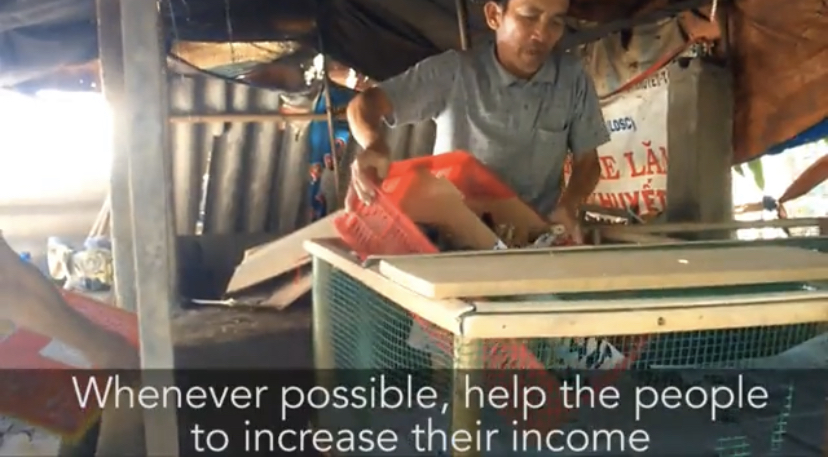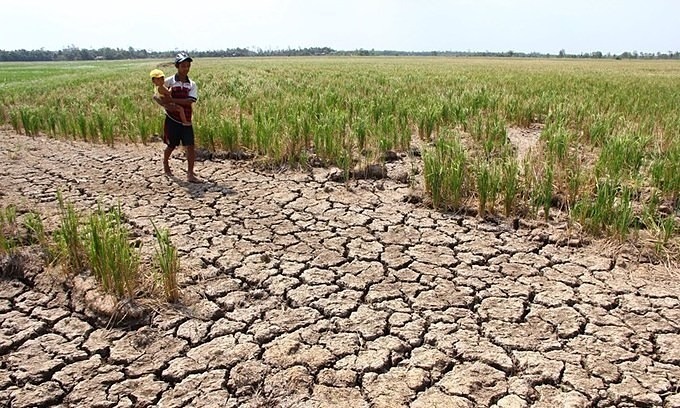By Tran Vu Ngan Giang (Giang Tran), Chevening Scholar, MSc Student, International Management & International Relations, Oxford Brookes University –
Part One has brought us some case studies of firms in Vietnam, the UK, and other parts of the world performing their responsibility through this global crisis. The examples have shown us that:
i) balancing interests of stakeholders is adopted by many forward thinking businesses,
ii) Corporate Social Responsibility (CSR) goes beyond a one-off charitable giving, and that
iii) the private sector with its diverse resources could be part of the solutions to this on-going battle against Covid19.
This second part reaffirms stakeholders’ power over business and cross-sector collaboration in CSR, as well as suggesting some thoughts for CSR as we come to the other side of this uncertain time.
We are Interconnected
Although state governments play a key role and spend enormous resources in fighting against this pandemic, the positive responses from the private sector have unquestionably been contributing significantly to this collective effort. Without the collaboration and specific actions at grassroots level from the private sector (as case studies provided in Part One), how many more people will be infected, how many of them will not have a bed in hospital, and how many more lives will not be saved? We are aware of how hard the economy is being hit. Without focusing on employees and clients, or investing in the relief effort to build community resilience, how would businesses alleviate the pandemic’s impact and survive themselves?
Tax systems, even in major economies, would not be sufficient to cover all aspects of the impact that this outbreak is creating. And for developing countries, which are an integral part of the supply chain (predominantly producers, but increasingly as domestic consumer markets), the cost of this disease exceeds the state capacity. It is therefore time for business to voluntarily ‘do the right things’ for humanity, for the customers, and for the resilience of the market.
Story of spirit makers making hand sanitisers is a great example of business ethics during the pandemic. In the UK, alcohol sales have risen sharply (Butler, 2020). Although this has created a positive opportunity for distilleries, many spirit producers – Verdant, Brewdog, 58 Gin, and many others around the nation – have decided to turn their alcohol business into one-time hand sanitiser factories to respond to the desperate needs of the local hospitals and care homes (Rear, 2020).
Their voluntary action has inspired another local university and private business to contribute other ingredients to make the sanitisers. Such collaboration enabled Verdant to deliver its commitment of producing 400-litres of sanitisers (Rear, 2020). Diaego, the worldwide producer of Johnnie Walker and Smirnoff, has also donated its alcohol to the sanitiser producers to make 8 million bottles of sanitisers in the UK, Ireland, Italy, US, Brazil, Kenya, India, and Australia (Kindred, 2020).
On the contrary, there have been some bad practices of corporate responsibility during this time too. Billionaire Premier League clubs – Liverpool, Newcastle, Tottenham, Norwich – have faced strong criticism for their intention of applying for the British government’s job retention scheme. They have been accused by their supporters, former players, the government, and public for their ‘unethical action’ of taking advantage of the public’s money, which has been set up to assist the seriously affected business through the crisis. The pressure from their stakeholders has pushed them to apologise and think of alternative ways from their own capacity to cover their employees’ wages as furloughing them (Hunter, 2020).
The two above stories not only prove the power of stakeholders over the businesses’ morality, reputation, and distinctive advantage, but also reaffirm the cross-sector collaboration that is crucial through this pandemic.
This Covid19 has again reminded us that we are all connected to each other – business, government, customers, employees, society – we are interconnected. The crisis we are experiencing has proved that CSR is a radical and vital mechanism that protects the business itself at the same time of pulling resources, developing solutions, and taking action for the resilience of society, the market and stakeholders that business is accountable for.
Rethink of CSR Moving Forward
The global pandemic and lockdown time have been giving space for businesses to look at their CSR, their significant role in the ecosystem of what could be described as ‘sustainable development’. This social distancing time has brought us all closer together – government, private sector, nonprofits, and communities – to fight against this invisible enemy. When we reach the other side of this crisis, and we certainly will, what will the stakeholders remember of the firms – the companies that prioritised their benefits during challenging and uncertain times, or the businesses trying to abuse the tax-payers’ money for their own interest?
For more than half a century, CSR is reaffirming us of its powerful guidance for firms to do business in an ethical and sustainable way for the value of the business as well as the resilience of our society, and our planet. In a nutshell: to do what we do better, and more ethically.
Obviously, we would have never wanted our world suffering like it is now. But Covid19 has woken us up with awareness of social and environmental challenges. Recent articles from The Guardian have reported that 500 million people could be forced into poverty (Busby, 2020), and they have estimated that the 800 million people suffering from hunger globally could be doubled in the next few months, as an aftermath of the disease (Harvey, 2020).
The United Nations, many other international NGOs, as well as local nonprofits in Vietnam have been raising concern of increasing domestic violence, child abuse, discrimination, and racist insults during this pandemic.
From the positive side, an analysis, reported by Carbon Brief, has shown that 25% of CO2 emissions in China have been temporarily cut, as a result of their nearly three-month lockdown. Although it is not certain, it is estimated that this pandemic, with many countries applying social distancing measures, could bring a largest fall ever of global CO2 emission – more than 4% in comparison to 2019 (Evans, 2020).
It is not difficult to notice that the skies in Saigon and Hanoi have been bluer in the last month or two, and here in Oxford, I could hear the sounds of birds singing clearer than ever before.

Coronavirus could significantly cut global CO2 emission
So, this pandemic has got our attention to the environment, our communities, and our world. It has also been encouraging firms, as well as individuals, to take actions to create shared values. But – why do we only pay closer attention and ‘do something’ when it is in an emergency?
Another example of non-state actors responding quickly to emergency relief efforts. In March 2020, individuals in the community, as well businesses, and non-state associations in Vietnam have been actively making donations to the devastating drought and salinity in the Mekong Delta.
Again – why do we only take actions in emergency relief efforts?
The fundamental cause that puts the Mekong Delta into such an emergency stage is climate change caused by industrialisation, by daily businesses’ operations, by human’s actions of over-bullying our mother earth.

Assisting livelihood for the poor in the Mekong Delta by Thien Chi non profit organisation. Image: from video shared by Bernard Kervyn
Coming back with Covid19, none of us would like ourselves or our beloved to catch the disease, or in even worse case scenario – to get admitted to the intensive care unit. Perhaps many habits have been changed too – washing hands for 20 seconds, being mindful of nutrition, care for each other, for employees, and for customers.
However, would we change the way we get involved in the collective efforts to tackle the social and environmental issues? For firms, would they continue to take ethical and responsible responses to their stakeholders (as they are performing now, during this pandemic) at their core strategy, once we come to the other side?
We try to prevent the virus before catching it.
So, with climate change, the environment, and other social challenges, which are still going on (invisibly) everyday, why don’t we prevent them?
Why do businesses have to wait until our earth and society suffer in an emergency as we are now, to take more serious actions?
Why is CSR not taken as a strategic investment in daily practice to minimise potential risks rather than being considered as a ‘not-generating-income’ function of a firm?
Businesses’ responses during this pandemic have been giving us some perspectives about CSR practices. Again, CSR goes beyond emergency support, or one-off charitable giving. In this middle of Covid19, these lines from the book ‘Stakeholder Theory – The State of The Art’ (Freeman, et al, 2010, p.237) are worth considering for businesses to (re)think of their CSR as we move forward:
‘The strategic management of the firm works basically as an “equilibrating mechanism” designed continuously to find solutions that systematically take into consideration and constantly strive to balance the interests of all the corporation’s stakeholders.’

A rice field in Soc Trang province, Mekong Delta in 2018. Image: AFP
- English language edited by Hugo Driver.
Reference:
- Busby, M. (2020) ‘US Briefing: Global Poverty Warning, Trump Agenda, Misinformation’, The Guardian, 09 April. Available at: ttps://www.theguardian.com/us-news/2020/apr/09/us-briefing-global-poverty-warning-trump-agenda-misinformation(Accessed: 09 April 2020)
- Butler, S. (2020) ‘UK Sales of Baking Goods and Alcohol Rise While Makeup and Plants Fall’, The Guardian, 20 April. Available at: https://www.theguardian.com/business/2020/apr/20/uk-sales-of-baking-goods-and-alcohol-rise-while-makeup-and-plants-fall (Accessed: 22 April 2020)
- Evans, S. (2020) ‘Analysis: Coronavirus Set to Cause Largest Ever Annual Fall in CO2 Emissions’, Carbon Brief, 09 April. Available at: https://www.carbonbrief.org/analysis-coronavirus-set-to-cause-largest-ever-annual-fall-in-co2-emissions(Accessed: 10 April 2020)
- Freeman R. E., et al (2010) Stakeholder Theory – The State of the Art. New York: Cambridge University Press.
- Harvey, F. (2020) ‘Coronavirus Could Double Number of People Going Hungry’, The Guardian, 09 April. Available at: https://www.theguardian.com/world/2020/apr/09/coronavirus-could-double-number-of-people-going-hungry (Accessed: 09 April 2020)
- Hunter, A. (2020) ‘Liverpool Reverse Decision to Furlough Staff after Fierce Criticism’, The Guardian, 6 April. Available at: https://www.theguardian.com/football/2020/apr/06/liverpool-reverse-decision-to-furlough-staff-after-fierce-criticism-coronavirus(Accessed: 20 April 2020)
- Kindred, A. (2020) ‘That’s the Spirit Johnnie Walker and Smirnoff Maker Diageo Pledges Enough Alcohol for 8 Million Sanitiser Bottles for Coronavirus Medics’, The Sun, 23 Mar. Available at: https://www.thesun.co.uk/news/11236126/coronavirus-johnnie-walker-smirnoff-hand-sanitiser/ (Accessed: 20 April 2020)
- Rear, J. (2020) ‘From Spirits to Sanitiser: the Distilleries Producing Hand Gel instead of Gin’, The Telegraph, 19 March. Available at: https://www.telegraph.co.uk/food-and-drink/features/spirits-sanitiser-distilleries-producing-hand-gel-instead-gin/(Accessed: 20 April 2020)

